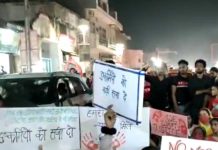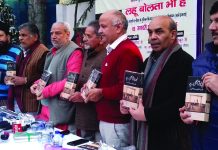A military court has recommended life imprisonment for the Army captain involved in a fake encounter at Amshipora in 2020, in which three youths from the Rajouri were killed. But there are doubts over Army brass’s intent to implement the punishment, writes Riaz Wani
A military court has recommended life imprisonment for the Army captain, who was involved in the fake encounter at Amshipora in South Kashmir, in which three youth from the Rajouri district of Jammu and Kashmir were killed on July 18, 2020, and passed off as militants. The decision which came as a pleasant surprise to people has been hailed by the political and civil society groups in the union territory.
The court found that Captain Bhoopendra Singh, of the Army’s 62 Rashtriya Rifles, then stationed in South Kashmir’s Shopian district, “exceeded powers vested under the Armed Forces (Special Powers) Act” during the encounter. The life sentence for Captain Singh is “subject to confirmation by higher Army officials” and the process involved in such cases is still on, according to army sources.
After the encounter took place in 2020, the police had accused Singh and two associates of planting weapons on the bodies of three labourers – Imtiyaz Ahmed, Abrar Ahmed and Mohd Ibrar. The Army had claimed to have killed three unidentified militants in the said encounter. But once their pictures were splashed in newspapers and circulated on social media, three families in Rajouri claimed they were their children and insisted they had had no terror links. According to the families, the trio had gone to Shopian to work as labourers.
The Army at the time was quick to order a high-level Court of Inquiry into the encounter and soon indicted Captain Singh. The Army also confirmed that the three youth killed in the encounter were civilians from Rajouri.
But there are still doubts about the Army’s sincerity to take the probe to its logical conclusion.
Demanding that the victim families of the fake encounter be given government jobs, former Jammu and Kashmir chief minister Mehbooba Mufti expressed hope that the Army court’s recommendation for life imprisonment for the accused is followed up with the implementation of the punishment.
“We have seen, be it in Pathribal or Machhil, action in fake encounters was promised but ultimately, nothing happened,” Mufti said while talking to reporters.
Machil, Pathribal
The past record of the Army in such probes also doesn’t give much confidence. In 2015, in a first such decision of its nature over the last three decades, the army’s northern command endorsed life imprisonment for six army personnel, including a colonel-rank officer, by a General Court Martial in the infamous 2010 Machil fake encounter case.
Those convicted included the then Commanding Officer of the 4 Rajput regiment Col DK Pathania, Captain Upendra Singh, Havildar Devendra Kumar, Lance Naik Lakhmi, Lance Naik Arun Kumar and Rifleman Abbas Hussain Shah of Territorial Army.
The personnel were held guilty of luring three Kashmiri youth – Shehzad Ahmad, Riyaz Ahmad and Mohammad Shafi – to Kalaroos in Kupwara on the promise of job and money and were later shot dead dubbing them as the terrorists infiltrating from Pakistan.
For years, Machil encounter had become one among the major cases of the human rights violations in J&K, that symbolized everything that had gone wrong with the security management of erstwhile state beginning with early nineties massacres through Pathribal and Ganderbal fake encounters to the curbs on everyday life.
In an encounter at Pathribal in South Kashmir in March 2000, five innocent Kashmiris were killed in cold blood and passed off as the terrorists. They were blamed for the massacre of 36 Sikhs at Chittisinghpura. Though the CBI that probed the case termed the Pathribal encounter as fake, the Army subsequently gave itself a clean chit.
Would the trial of the Amshipora encounter set the record straight? It seems to have done so. It remains to be seen whether the sentence recommended by the military court is confirmed by higher Army officials.













